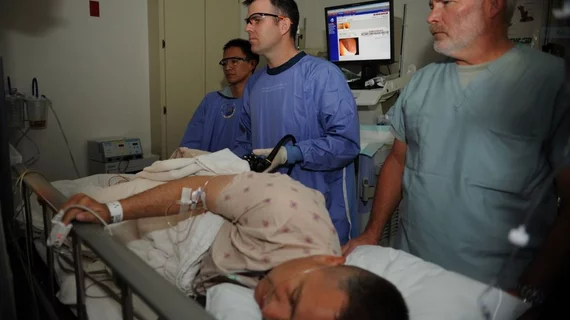Q&A: Wision AI CEO talks new algorithm for polyp detection
A key step in preventing colon cancer is the detection and removal of precancerous polyps during colonoscopies. Researchers with Wision AI, a Shanghai-based startup that develops computer-aided diagnosis software for endoscopy imaging, are one step closer to that goal after a newly-developed machine-learning algorithm was validated during a recent study.
In an interview with AI in Healthcare, JingJia Liu, chief executive officer at Wision AI, discussed the new algorithm, what’s next for the company and how AI products can impact the medical industry. She also sought to help define the industry.
“The name ‘deep learning’ always misleads people to think that computer could ‘learn' by itself, gain new knowledge and evolve. From a mathematics point of view, deep learning is a group of fitting functions. It cannot learn, and no new knowledge would be gained through feeding data to it,” Lui told AI in Healthcare. “Being an AI research and development company, we have to be truthful to the limitation of the technology, and utilize it to solve the problem it can solve.”
AI in Healthcare: Wision’s new machine-learning algorithm for improving polyp detection during colonoscopies was validated in a recent study. Can you explain the importance of this milestone and what it means for diagnostic imaging?
JingJia Liu: Automatic polyp detection has been a hot research area of computer science in the past decade, but none had achieved both high sensitivity and high specificity of clinical applicability. Now with sensitivity and specificity both above 94 percent, Wision AI’s algorithm could be deployed in clinical settings.
With a broader view of AI in medical imaging, this study uses the most rigorous validation methods ever.
- The validation data set was prospectively collected against the development dataset. Commonly in other studies, a single database was divided into development and validation dataset.
- The validation dataset (1.16 million images and video frames) was more than 200 folds larger than the development dataset (5,545 images). Commonly in other studies, the validation datasets are only less than one-tenth of the training datasets.
What is the next step for the algorithm?
This version of the algorithm has embedded in a system which is being validated in several clinical trials in different countries. Actually, the first clinical trial was completed on Feb. 2018 in China and the study was presented at European United Gastroenterology Week 2018 in Vienna as oral presentation No.005, and received National Scholar Award.
Wision AI is committed to bring more AI solutions of great clinical value to the GI endoscopy. The next move is [to] help early detection of esophagus cancer. One study of validation on the company’s squamous cell carcinomas detection algorithm has been presented on American Congress of Gastroenterology 2018 in Philadelphia.
AI technologies have the potential to greatly improve several areas within the healthcare industry. In your opinion, which areas do you think will benefit the most from the use of AI?
I would answer this in another way, the AI product that fits the current medical procedure or clinical practice will have more impact. We’ve seen a tremendous number of AI in healthcare studies published, but very few of them are clinical trials. The AI performance on specific healthcare task need to be validated, but more important is that how much improvement will this AI bring to the clinical practice, which could be validated through clinical trials. Unfortunately, most of the AI haven’t been ready for trials, either because one is not with good performance, or is not relevant to the current clinical practice.
No matter [what] an AI technology is about–radiology, pathology, or endoscopy–as long as it fits in the clinical practice with desirable performance, it would have bright future to upgrade the level of care.

